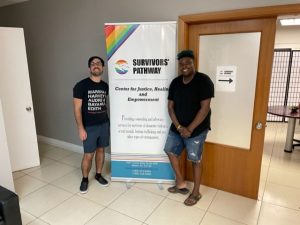
Research Content Areas
My research focuses on four content areas: (1) relational experiences and mental health outcomes among Latinx LGBTQ youth and their families and communities, (2) relational experiences and mental health outcomes among transgender and gender diverse (TGD) youth and their families, schools, and communities, (3) LGBTQ adults’ experiences of discrimination, oppression, violence, and support, and (4) immigration and mental health outcomes within Latinx communities. Visit https://cheverelab.com/ for more details Dr. Abreu’s work, including current research projects, resources, lab members, and collaborators. Below I highlight my research areas.
Latinx LGBTQ Youth and their Families and Communities
Regarding my contributions to research with Latinx LGBTQ youth and their families and communities, my work uses mixed methods to understand the importance of Latinx families and communities in the psychological well-being of Latinx LGBTQ youth. One of the most unique aspects of this research is that is grounded on Latinx cultural values, beliefs, and traditions (e.g., familismo, gender norms [caballerismo, machismo, marianismo], respeto, religion/spirituality) and how these are positioned within multiple systems of oppression. That is, my research in this area seeks to understand how the relationship between Latinx LGBTQ youth and their families and communities is the result of cultural traditions and messages, as well as the racist, xenophobic, cissexist, and heterosexist environments that both Latinx LGBTQ youth and their families and communities navigate. This research provides a unique lens about the experiences of acceptance and rejection for Latinx LGBTQ youth that is different than the scholarship with predominantly White LGBTQ youth. An example of the unique contributions of my research in this area is the development of the first-to-date scale to measure LGBTQ-specific acceptance among Latinx parental figures.
TGD Youth and their Families, Schools, and Communities
Regarding my contributions to research with TGD youth and their families, schools, and communities, I have led national studies that seek to understand the experiences of these communities within multiple systems of oppression. For example, I co-designed the first-to-date national study of parents of TGD children and youth. This mixed methods project, Experiences of Parents and Caregivers of Transgender and Non-Binary Youth Study in the U.S., is a collaboration with the Human Rights Campaign Foundation (HRCF), one of the nation’s largest and most effective LGBTQ+ advocacy organizations. In a parallel project, Braving and Enduring the US as Authentic Trans youth Study (BEATS), I co-designed a nation-wide survey with TGD youth to understand their experiences during the COVID-19 pandemic and the mental health impact of anti-trans laws and bills on this community. In addition, my research has investigated ways in which schools can be more inclusive of TGD students. This line of research includes studies that seek to systematically examine ways to prevent TGD-specific bullying and discrimination, and ways in which school administrators and staff members can appropriately and effectively advocate and provide services to TGD students.
LGBTQ Adults Experiences of Discrimination, Oppression, Violence, and Support
Regarding my contributions to research about the experiences of discrimination, oppression, violence, and support among LGBTQ adults, I have led extensive research that explores the daily experiences among these community members at the intersection of racism, xenophobia, cissexism, and heterosexism. My research in this area has uncovered ways in which exposure to physical and emotional violence, as well as political discrimination and violence, difficulties seeking employment, barriers to seeking and receiving culturally-appropriate healthcare services and resources, and exposure to the COVID-19 pandemic impacts the mental health of these communities. In fact, many of the studies I have led within this line of research are among the first ones to provide a holistic, systemic, and strength-based understanding about the experiences of BIPOC LGBTQ adults within multiple systems of oppression. These studies have research, clinical, and policy implications, including recommendations for shifting therapy goals and allocation of resources.
extensive research that explores the daily experiences among these community members at the intersection of racism, xenophobia, cissexism, and heterosexism. My research in this area has uncovered ways in which exposure to physical and emotional violence, as well as political discrimination and violence, difficulties seeking employment, barriers to seeking and receiving culturally-appropriate healthcare services and resources, and exposure to the COVID-19 pandemic impacts the mental health of these communities. In fact, many of the studies I have led within this line of research are among the first ones to provide a holistic, systemic, and strength-based understanding about the experiences of BIPOC LGBTQ adults within multiple systems of oppression. These studies have research, clinical, and policy implications, including recommendations for shifting therapy goals and allocation of resources.
Immigration and Mental Health Outcomes within Latinx Communities
Regarding my contributions to research about immigration and mental health outcomes within Latinx communities, I have co-led studies that seek to explore the effects of immigration on acculturative stress and mental health outcomes among Latinx community members, with specific attention to the Puerto Rican community in the mainland United States. Colleagues and I have explored how Puerto Rican community members living in Florida (one of the largest concentrations of Puerto Ricans outside the island) were impacted by Hurricane Maria and implications for how psychologists may provide culturally informed mental health support as a result of this natural disaster. In addition, I have also co-facilitated studies that explored systemic reasons for Puerto Ricans migrating to the mainland United States and the experiences of post-migration conditions once in the mainland United. This line of research has led to new models grounded on the main tenets of colonial mentality.
Visit https://cheverelab.com/ for more details Dr. Abreu’s work, including current research projects, resources, lab members, and collaborators.